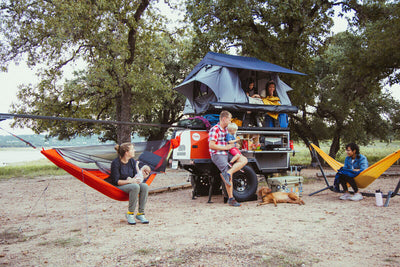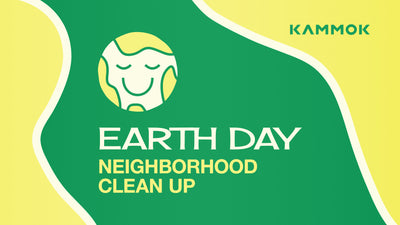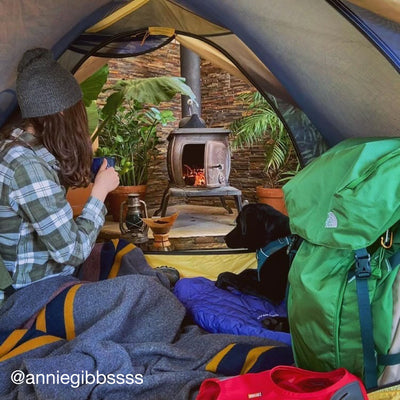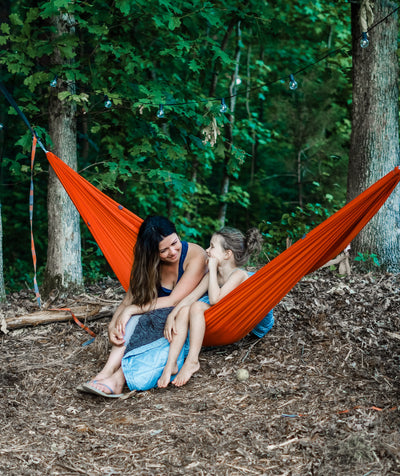12 Amazing Albums Playing in the Office.
Here are some tunes for your week, from our office to yours! Much love and listening!
Here are some tunes for your week, from our office to yours! Much love and listening!

The ultimate hammock basecamp We teamed up with TAXA Outdoors to put a Kammok spin on their Woolly Bear habitat. The result is a go-anywhere, do-it-all trailer that's ready for any hammock adventure. We could all use a little more time outside, and the Kammok Edition Woolly Bear is the perfect tool for getting out and staying out. The Camp Chef's Dream Kitchen One of the biggest barriers to getting outside is the comfort you leave behind at home, one of the most crucial being a fully functioning kitchen with everything you need at your fingertips. The Woolly Bear kitchen offers the best of both worlds, with clever organization, plenty of workspace, and the ideal outdoor setting. Now you can get outside with confidence and cook to your heart's content. A Gear Closet on Wheels The Kammok Edition Woolly Bear has a place for all your camping essentials. No more packing and repacking: Load up once, and you're always ready for the next outing. Introducing the Outpost We knew a Kammok Edition Woolly Bear wouldn't be complete without a robust, full-size hammock setup. The Outpost easily attaches to the cargo deck of any Woolly Bear and allows you to hang a full-size hammock in virtually any setting. The Outpost's lightweight frame make it a cinch for anyone to deploy, and the tool-free setup means it's ready to go with the press of a button. Adjustable legs and a 360 degree swivel mount allow you to hang your hammock on any landscape, from smooth blacktop to the roughest backcountry campsites. Create the ultimate hammock basecamp by attaching up to six Outpost hammock stands to your Woolly Bear. With the addition of a rooftop tent, your Woolly Bear can comfortably sleep up to nine happy campers. Arriving Spring '22: Outpost 2.0 will allow for attachment to your vehicle's roof rack or a single tree.

Kammok Outsiders know the feeling of connection that comes from stepping into nature. It’s the first breath of fresh air when we get out of our cars and into the mountains. It’s the audible sigh after jumping into the ocean where all we hear are the rhythmic waves crashing onto white sand beaches. However, there’s no doubt that these spaces and experiences away from our screens are in danger due to climate change. Our commitment to protecting the environment for current and future generations extends beyond Earth Day. We’ve announced our commitment through our partnership with Climate Neutral (read more on it here). We know that for there to be any hope of surviving the climate crisis, we have to take action as both a brand and as individuals. Earlier this month our team at Kammok paused work at the office and hit the trails, but this time we didn’t camp or climb. Instead, we decided to pick up the trash that humans have left behind along a local trail. We spent our day walking the Barton Creek Greenbelt in Austin and picked up a surprising amount of dog poop bags, styrofoam cups and plastic wrappers that were bound to end up contaminating waterways, buried in the soil for hundreds of years or in the stomach of wildlife. For anyone who spends time outside, we urge you to take another look at the seven principles of Leave No Trace. They have great educational resources about the importance of creating minimal impact in wild places. Still have questions or aren’t sure why this is important? Drop us a message on Instagram, we’d love to hear from you! After our team outing on the greenbelt, we decided to get the community involved. For this cleanup, we wanted to hit the streets instead of a trail. So much of the trash that ends up in the wild actually comes from urban areas. With heavy rainfall, winds and waste transportation, a lot of it makes its way to natural areas. We put out an invitation for people in Austin to join us in cleaning up our neighborhood. We set up outside and welcomed new and familiar faces to the Gear Shop for a trashy adventure. We split into two groups and made our way East, trash bags in hand, gloves and grabbers at the ready, we walked along the streets picking up plastic wrappers, cigarette butts, old shoes, rags, glass bottles, and styrofoam. Along our route, we were pleasantly surprised by the number of people who stopped to thank us for picking up trash. People know it’s a problem, it’s a matter of getting out and doing something about it. Protecting our planet is not only an environmental issue but as our founder Greg McEvilly says, is a human issue. It affects our way of life and it’s our responsibility to do something about it. While picking up trash may not be a long-term solution, it’s a small action we can each take in addition to lowering our consumption of single-use products, using alternative modes of transportation, and choosing to support brands that take climate change seriously. At the end of the day, we didn’t just spend a Thursday evening cleaning up trash, but also connecting with people who understand the power of collective action. Thank you to those who showed up for our first community cleanup in Texas. We can’t wait to organize more in the future and expand to other locations. Stay tuned for future events in Austin by following @Kammok_ATX on Instagram.

Another National Camp at Home Day has come and gone, and we can’t say thanks enough to everyone who participated. You wowed us yet again with your creativity. From indoor campfires and starry skies to an actual outdoor igloo, you guys absolutely crushed it. We geeked out over your clever hammock spots and perfectly roasted mallows, but with over 500 campsites globally, more than anything we were in awe of the sense of community that continues to develop around this event. This year, as we focused more on preparedness, we invited a few of our friends to share a bit about hitting the trail, sustainable camping, adventuring with kids, and a whole lot more. Check out our previous blog posts if you haven’t already, and get ready for the camping season! It’s spring here in Texas, with wild flowers blooming and bright green leaves budding from formerly barren trees, and the Kammok team is ready to hit the trail. We hope you’ll do the same. Take the confidence of having just pitched your tent in your backyard or living room, and go check off a new national or state park! This day started as a way to cope with the quarantine blues, but with your help, we hope to build this into a community event for campers who are always learning and preparing for the next big adventure. If you haven’t already, join the conversation on our National Camp at Home Day Facebook group. We created this space for people to learn and get inspired from one another, and as a way to help each other get ready for whatever campsite is calling you next. Share your favorite gear, camping recipes, parks, or whatever gets you excited to be outside with the people you love. Until next year, campers! We’ll see you on the trail.

We've grown acquainted with the backyard (maybe a little too much) over the past few months. Every corner of the yard investigated, every blade of grass counted, and no stone left unturned. You’ve become the park ranger of your terrain. So, why not take this opportunity to learn a new skill – learn to hammock camp in the backyard. Across any outdoor activity, it’s best practice to give your gear a test run before heading into the great outdoors. Imagine if you arrive at your campsite when it’s dark, raining, or right after a tiring drive, you’ll be frustrated as you attempt to rig your system for the first time. There is no better space like the backyard to master new skills and bring confidence for days ahead in the backcountry. Whether you’re an avid tent camper wanting to give hammocks a go, or dipping your toes into camping for the first time, give yourself a test run in a familiar and safe environment. Plus, if it turns out hammock camping isn’t for you (we highly doubt it as the hammock people we are), your bedroom is just a few steps away. Let’s get started. Backyard role call Before we talk about the not-so nitty-gritty details of hammocks, let’s talk about the anchor points where you will hang a hammock. Take inventory of your backyard for tall sturdy structures that can safely support your weight. You’re looking for a pair of live trees or sturdy posts about 12-15 feet apart. Since you're in your backyard, don't hesitate to take out the measuring tape to get a feel for the distance. If you don't have a pair of trees, you can also hang between two car racks or between a car rack and a tree. Shopping for the essentials A hammock and a pair of straps are the bare essentials to get camp off the ground. It’s as simple as that. You can take it to the next level with bug protection, weather shelters, and hammock insulations, but we’ll focus on just the essentials for this blog. Essential #1 Hammock When shopping for a hammock, you’ll want to look at the material and weight capacity for strength and durability. Aim for ripstop nylon fabrics. If your hammock gets a small hole, ripstop will prevent additional tearing so your hammock doesn’t shred like string cheese. You’ll also want to take into consideration the size of the hammock for comfort. The right hammock size is a matter of individual preference. Hammocks come in multiple sizes and most people will have no problem finding a comfortable fit. Best used for Lounge Capacity Dimensions Max Weight Capacity Packed Weight Roo Single UL Backpacking 1 person 4 ft 2 in x 8 ft 4 in 300 lbs 5.6 oz Roo Single Camping & lounging 1 person 4 ft 2 in x 8 ft 4 in 400 lbs 10.2 oz Best used for Lounge Capacity Dimensions Max Weight Capacity Packed Weight Roo Double Camping & lounging 1 - 2 people 5 ft 7 in x 10 ft 500 lbs 18 oz Roo Double XL Camping & lounging 2 - 3 people 6 ft 6 in x 11 ft 6 in 500 lbs 22 oz One last thing to consider when shopping for a hammock is the modularity capabilities for adding creature comfort accessories like under quilts, sleeping pads, etc. All the hammocks listed above have integrated loops lining the fabric edge, making it possible to attach accessories. You may not need these loops for your first test run in the backyard, but you’ll be glad to have them in the backcountry. Essential #2 Hammock straps When researching hammock straps, you’ll see the term “hammock suspension system” come up a lot. This simply refers to how a hammock hangs between anchor points, aka the straps and carabiners (sometimes toggles) that connect the hammock to the straps. It’s good to note not every hammock brand provides carabiners, which is why you’ll see carabiners included in some strap packages. If you’re picking up any Kammok hammock you won’t have to worry about this. Strap style: You’ll see all sorts of shapes and sizes from rope to flat webbing. Ropes require knot tying skills and due to the thin characteristics of their design, they tend to cut into tree trunks. We recommend flat webbing straps to evenly distribute weight on the tree and they do not require knots. Webbing straps are easy to use and great for first-time hammockers. Strap length: Hammock straps are typically sold in a pair, two individual straps in a single package. You’ll want to look at the length of each strap and the combined length. We recommend 10ft straps (a combined length of 20ft) for the most common setup. If your anchor points are very far apart or very wide in diameter, you could increase the strap length with extenders or opt for longer straps. Strap attachment points: Hammock straps have several loops along the strap to clip in a carabiner. The more points of attachment, the better control you’ll have in setting the optimal hang angle. Weight capacity: The weight capacity of your straps is just as important as your hammock. Your straps should at least match or go above the weight capacity limit as your hammock. Best used for Strap Style Combined Length Length per strap Attachment points per strap Weight Capacity Packed Weight Python 10 UL Backpacking Flat webbing 20 ft 10 ft 20 points 300 lbs 3.2 oz Python 10 Camping & lounging Flat webbing 20 ft 5 in 10 ft 2.5 in 20 points 500 lbs 8.2 oz Best used for Strap Style Combined Length Length per strap Attachment points per strap Weight Capacity Packed Weight Python 15 Camping & lounging Flat webbing 30 ft 3 in 15 ft 1.5 in 33 points 500 lbs 11.8 oz Python Extenders Camping & lounging Flat webbing 9 ft 2 in 4 ft 7 in x 2 in 1 point 500 lbs 6.4 oz Setting up your hammock Once you’ve acquired the essentials, you’re ready to hammock camp in the backyard. As we walk through the steps below we’ll use a Roo Double and Python 10 straps as the example. Step #1 - Find the perfect spot: Great job! You already scouted the backyard for the perfect anchor points to hang your hammock. The ideal anchors are 12-15 feet apart and sturdy to hold your weight. For a Roo Single, a shorter hammock, the ideal distance is 10-13ft. For a Roo Double XL, a longer hammock, the ideal distance is 13-15ft. For this example, we’ll refer to the anchor points as trees. Step #2 - Putting up the straps: The ideal height to hang each strap is at eye level or higher. The widest end of the straps should rest around the tree. To hang, feed the narrow end of the strap through the opening of the wide end. Step #3 - Attaching the hammock: With the carabiner attached to your hammock, clip the carabiner into one of the attachment points on your strap. Repeat on the other side. The goal is to have the lowest point of your hammock hang no more than 18 inches off the ground, roughly shin height. This may take a couple of tries since it’s your first time, but once you’ve got it down, next time will be a breeze. Step #4 - Get in: We recommend weight testing with your arms before jumping in. Push down firmly on the hammock and make any adjustments if needed. Once everything looks and feels good, you’re clear to get in. A final word of advice for backyard campers Going hammock camping in the backyard is as simple as owning a hammock and pair of straps. You can take it to the next level with bug protection, weather shelters, and hammock insulations, but if you don’t have that gear, that shouldn’t stop you from trying something new. Add warmth by using a sleeping bag you already have or pull the sheets off the bed. Check the forecast to camp on a clear night to eliminate the need for a weather shelter. Plus, you'll be able to stargaze without a shelter over your head. By using what you have and checking the weather beforehand, you don’t have to go all-in acquiring the additional gear until you’re ready. Start small in the backyard and work your way up to camp in the backcountry.